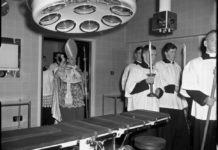Kathleen Loy, who died on November 18th 2015, aged 91, was one of the most long-serving, loyal and dedicated members of the Workers’ Party.
Born Kathleen O’Neill in Dundalk, she was as a young woman disgusted with the economic impoverishment of the country and by the miserable wages and living conditions available to workers and their families. Disgusted also by the brutality and inhumanity of government treatment of republican prisoners during the 1940s, Kathleen joined the Republican Movement in 1948. Kathleen was also a member of the then Cumann na mBán and had many interesting stories to tell, from a woman’s point of view, of the border campaign of 1956-62.
In the 1960s Kathleen lived in Newry with her husband Tony and their children. There she was deeply involved in setting up the new Republican Club structures and also in the development of the nascent civil rights movement – NICRA. Kathleen often reminisced that these days, with popular and peaceful unity around simple democratic demands, was the most hopeful period in her entire political career.
Throughout the splits that afflicted the movement, whether motivated by narrow nationalism, ultra-leftism, or mere careerism, Kathleen remained staunch in her commitment.
In 1972 Kathleen moved to Bray, where she was to spend the remaining 43 years of her life. Kathleen was soon fully involved in the local party branch and to the forefront in campaigning with the local residents for the installation of fireplaces, proper insulation, and the replacement of flat roofs with pitched roofs.
As well as her indomitable work for the Party, Kathleen demonstrated her practical concern for the welfare of people through myriad voluntary activities such as working for Meals on Wheels, and in the Oxfam shop. She was a member of Bray Choral Society until her death.
Kathleen suffered bad health for the last year of her life but, through the care of her family, was able to remain in her own home. She is survived by her children, step-children, grandchildren and great grandchildren (in all of whom she took great pride), other family members and a wide circle of friends.
She was one of the diminishing band of people who brought the party from the insularity of the 1950s to its present day socialism and she leaves a void that will be impossible to fill.
Padraig Mannion




